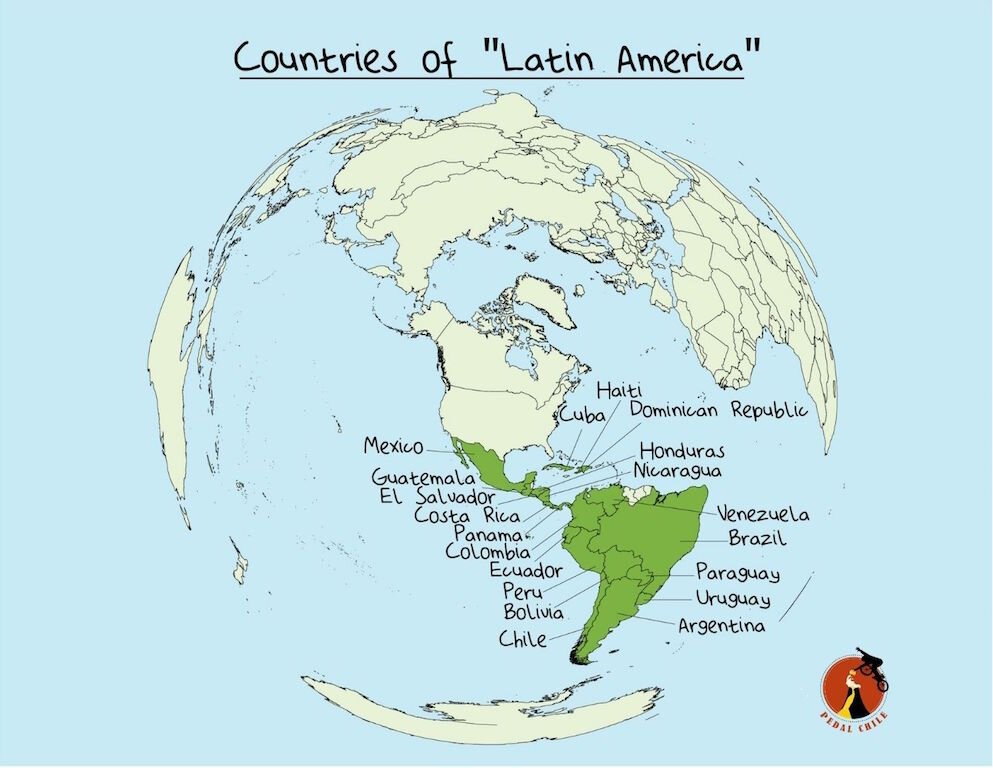Lu at Torres del Paine National Park - Chile’s Patagonia
What languages are spoken in Patagonia?
Spanish is the official and predominant language in both the Chilean and Argentinean Patagonia.
Mapudungun, German, and Welsh are minority languages of Patagonia, as Spanish is the predominant and official language of both the Chilean and Argentinian Patagonia.
Spanish settlements & patagonia
The first European to reach Patagonia was Ferdinand Magellan, a Portuguese captain serving the Spanish crown, who entered the strait now bearing his name in 1520.
The Spanish first attempt to colonize Patagonia was in 1584 when roughly 400 Spaniards founded two settlements near the Straight of Magellan in the southern tip of South America. Nombre de Jesus and the City of Rey Don Felipe was founded with the hope of blocking passage to British and Dutch fleets in the Straight of Magellan.
Strait of Magellan - Chilean Patagonia
As the harsh climate and lack of food destroyed the two settlements in only a few months. The City of King Philip was renamed by English sailor Thomas Cavendish who rescued the lone survivor and bestowed the name Port Famine or Puerto del Hambre.
Puerto del Hambre (Image Source)
In the 18th century, Patagonia was mostly inhabited by the indigenous peoples. Spain wanted to establish permeant settlements along the Atlantic Coast to ensure the Spanish sovereignty of the Patagonian region.
In 1881, Chile and Argentina signed an international treaty that legitimized the Patagonian territory as the sovereignty of both nations. During this period, Spanish became state-imposed in both Argentina’s and Chile’s Patagonia as a way to integrate Patagonia into the rest of their country, and to strengthen the claim on the land itself.
Lu en Volcán Villarrica
indigenous Mapudungun in chile’s patagonia
The Mapuche (Araucanian) and Tehuelche people are the indigenous aboriginal groups of Patagonia and speak Mapudungun. Translated into English, Mapudungun means language (dungun) of the earth (mapu).
The Mapuche are one of the only indigenous peoples in the Americas to defeat the Spanish and maintained their independence throughout the Spanish colonial period.
The Mapuche lived predominantly in the Chilean Patagonia but were forced deep into the Andes and into Argentian Patagonia after the euphemistically-named Pacification of Araucanía in 1881.
Today, Chile’s Ministry of Education is emphasizing the Mapuche culture with Mapudungun being taught in schools, especially in the Austral regions of Chile, which is the native lands of the Mapuche.
Today, nearly one-million people speak Mapudungun in both Argentina and Chile. The largest population of Mapudungun speakers reside in their native lands of the Chilean Lake District and in Temuco, which is the largest city in Patagonia on the Chilean side.
Lu in Chile’s Patagonia
Welsch settlements of Argentina Patagonia
Puerto Madryn - Argentina’s Patagonia (Image Source)
On July 28th, 1865 the ship the Mimosa arrived in Puerto Madryn, on the Atlantic Ocean of the Argentinian Patagonia. Two months prior a group of 162 Welsh pioneers left their homeland to create Y Wladfa Gymreig or the Welsh colony.
In the 1880s, the Argentinian state imposed the exclusive use of Spanish as it became the official language of all of Argentina, including the Argentinian Patagonia. The state-imposed the Spanish language as a way to integrate the Patagonia territory into the rest of the country through the use of one uniform language. Most of the Welsh language was lost during the subsequent generations and was only spoken at home or underground.
In 1997, the British Council’s Welsh Language Project (WLP) was started to revitalize the Welsh language in the Chubut Province, which includes the oceanside city of Puerto Madryn.
The three Welsh culture and language centers of Chubut had 1270 students learning Welsh in 2015. Today, Welsh is considered a heritage immigrant language in the Chubut Province of the Argentine Patagonia.
Image Source: (Griffiths and Tooth)
Interesting info: The first printed newspaper in any language in Patagonia was the Welsh newspaper Y Drafod.
lake district & German settlements
The Lake District of both Chile and Argentina is located in northern Patagonia and is often referred to as La Suiza Chilena y Argentina or the Switzerland of Chile and Argentina.
The Lakes District in Argentina - San Carlos de Bariloche, Río Negro, Argentina
Nazis & Patagonia
Contrary to popular perception the presence of Germans in Patagonia is not confined to Nazi fugitives, but principally from a German immigration period that began in the mid-19th century, when South American countries enjoyed years of independence and stability, while Germany was split and amid the March Revolution.
After World War I, Germans emigrated to Latin America at a considerable rate, with the high point being between 1919 and 1925 during the worst of the German inflation. Many of these German immigrants went to southern Chile and Argentina, which is also known as the Lakes District of northern Patagonia.
In Chile, many of these Germans settled in Valdivia, Osorno, and Puerto Montt.
Puerto Varas - about 19.6 km or 12 miles from Puerto Montt, Chile (South America)
Following World War II, Argentina and the Argentinian Patagonia were the main destinations of German emigrants because; Argentina was neutral during the war, had a sizable German community, and pro-Axis sympathetic President Juan Domingo Perón facilitated this German migration period.
At the end of the 19th century, the majority of San Carlos de Bariloche was of German-speaking descent.
After the Second World War, another massive wave of German settlement reached this picturesque Andean town. Today, Bariloche resembles a ski-town in Switzerland with Swiss alpine-style architecture and its famed chocolate and German-style beer.
Nowadays, the majority of German spoken is from tourists, yet it's not uncommon to hear multi-generation German speakers.
Bariloche, Provinz Río Negro, Argentinien
Final Thought
Spanish is the predominant and official language of Patagonia on both sides of the Andes Mountain Range. In a few areas, Welsh, German, and Mapudungun are spoken, however, these are minority languages in Patagonia as the vast majority of these residents are bilingual and also speak Spanish.
Jesse is Director of Pedal Chile and lives in Chile’s Patagonia. Jesse has a Master of Health and Human Performance and enjoys mountain biking all the trails of both the Chilean and Argentinian Lake District.
Sources and References:
Buscaglia, S. and Bianchi Villelli, M. (2016). From Colonial Representation to Materiality: Spanish Settlements on the Valdés Peninsula, Patagonian Coast (1779–1810). Historical Archaeology, 50(2), pp.69–88.
Carter, D., Davies, P., Deuchar, M. and Couto, M. del C.P. (2011). A Systematic Comparison of Factors Affecting the Choice of Matrix Language in Three Bilingual Communities. Journal of Language Contact, 4(2), pp.153–183.
de Jong, I. and Vezub, J. (2019). Archivos indígenas: uso, circulación y apropiaciones de la escritura en Araucanía, Pampa y Patagonia. Quinto Sol, 23(3), pp.1–3.
Griffiths, Hywel M, and Stephen Tooth. “Remembering and Forgetting Floods and Droughts: Lessons from the Welsh Colony in Patagonia.” Cultural Geographies, 27 Nov. 2020.
Meding, H.M. (1992). German Emigration to Argentina and the Illegal Brain Drain to the Plate, 1945–1955. Jahrbuch für Geschichte Lateinamerikas, 29(1).
Prins, H.E.L. (1993). The Welsh in Patagonia: The State and the Ethnic Community: The Welsh in Patagonia: The State and the Ethnic Community. Latin American Anthropology Review, 5(1), pp.29–30. link




















